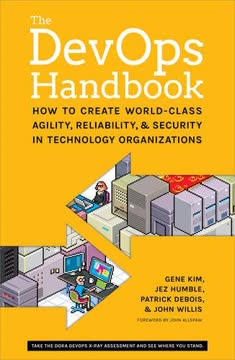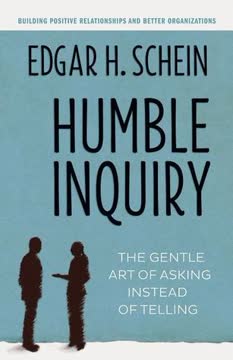Key Takeaways
1. Humble Consulting: A new approach for complex, messy problems
Humble Consulting is new in several respects.
A paradigm shift. Humble Consulting represents a fundamental change in how consultants approach complex organizational problems. Unlike traditional consulting models that rely on expert diagnosis and prescription, Humble Consulting acknowledges the inherent messiness and instability of modern organizational challenges. It emphasizes:
- Building personal, trusting relationships with clients
- Focusing on process rather than content
- Making small, adaptive moves instead of grand interventions
- Embracing uncertainty and complexity
This approach is particularly effective when dealing with issues that are interconnected, rapidly changing, and resistant to simple solutions. By adopting a humble stance, consultants can help clients navigate these complex terrains more effectively.
2. Building Level Two relationships: The foundation of effective consulting
To be really helpful requires locating what the real problem is, that is, what is worrying the client?
Trust and openness. Level Two relationships go beyond formal, professional interactions to create a more personal connection between consultant and client. This deeper level of trust and openness is crucial for:
- Uncovering the real issues behind surface-level problems
- Encouraging clients to share sensitive or uncomfortable information
- Creating a safe space for exploration and experimentation
To build Level Two relationships, consultants must:
- Show genuine curiosity about the client's situation
- Be willing to share personal insights and experiences
- Demonstrate commitment to the client's success beyond professional obligations
By fostering these deeper connections, consultants can access the information and insights necessary to provide truly effective help.
3. Personalization: The key to unlocking trust and openness
Personalization is telling one another a bit of our story of who we really are, where we have come from, and where we are going.
Breaking down barriers. Personalization is the process of moving beyond formal roles and facades to reveal more authentic aspects of oneself. In consulting, this involves:
- Sharing relevant personal experiences or insights
- Asking questions that go beyond surface-level issues
- Showing vulnerability and admitting to not having all the answers
However, personalization must be carefully balanced:
- Too little can keep the relationship stuck at a superficial level
- Too much can cross professional boundaries and create discomfort
The goal is to create a connection that allows for honest, open communication about the challenges at hand, while maintaining appropriate professional boundaries.
4. Process-focused interventions: Reshaping problem-solving approaches
The consultant can help the client (1) reformulate the problem, (2) rethink what the client's own role should be, and (3) rethink what the consultant should do.
Shifting perspectives. Process-focused interventions aim to change how clients approach and think about their problems, rather than providing direct solutions. This involves:
- Helping clients reframe their issues in more productive ways
- Encouraging clients to take ownership of the problem-solving process
- Suggesting alternative methods for gathering and analyzing information
Examples of process interventions:
- Changing meeting formats to encourage more open dialogue
- Introducing new tools for decision-making or brainstorming
- Reorganizing teams or communication structures
By focusing on process, consultants can help clients develop more effective and sustainable approaches to addressing their challenges.
5. Adaptive moves: Small steps for big impact
Adaptive moves have to be joint decisions because the consultant will never know enough about the client's personal situation or organizational culture, and the client will never know enough about all the consequences of a given intervention such as a survey or other diagnostic process tool.
Incremental progress. Adaptive moves are small, targeted actions designed to probe the problem space and generate new insights. They differ from traditional interventions in several ways:
- They are jointly designed by consultant and client
- They serve as both diagnostic tools and initial steps toward solutions
- They are flexible and can be quickly adjusted based on feedback
Characteristics of effective adaptive moves:
- Low-risk and easily reversible
- Designed to generate quick feedback
- Tailored to the specific organizational context
By making a series of adaptive moves, consultants and clients can navigate complex problems without committing to large-scale changes before understanding their full implications.
6. Changing the conversation: Innovative solutions through dialogue
Dialogic conversations are especially relevant to situations that are open-ended and complex, because the dialogue format is premised on thinking together to find common ground to figure out what to do, not to make a quick diagnosis or decision.
Collective wisdom. Changing the nature of conversations within organizations can lead to breakthrough insights and solutions. This involves:
- Moving from debate and discussion to true dialogue
- Encouraging diverse perspectives and voices
- Creating space for exploration and emergence of new ideas
Techniques for fostering productive dialogue:
- Implementing structured listening exercises
- Using visualization tools to map complex ideas
- Creating "cultural islands" where normal hierarchies are suspended
By facilitating more open and inclusive conversations, consultants can help organizations tap into their collective intelligence and creativity to address complex challenges.
7. Embracing complexity: Letting go of the expert role
Humble Consulting requires a new attitude of humility in the face of the complexity of the problems and humility in the relationship with the client in the sense that I am there to help work things out together, not to take over the problem and run with it.
Collaborative problem-solving. Embracing complexity means acknowledging that no single person, including the consultant, has all the answers. This requires:
- Letting go of the need to be seen as an expert
- Admitting to uncertainty and gaps in knowledge
- Viewing the client as an equal partner in problem-solving
Benefits of embracing complexity:
- More creative and innovative solutions
- Greater buy-in and ownership from clients
- Increased adaptability in the face of changing circumstances
By adopting a humble stance, consultants can create space for more collaborative and effective problem-solving approaches.
8. Culture matters: Deciphering and working within organizational DNA
Culture at its deeper levels is a shared group phenomenon that can be described and understood but not measured quantitatively.
Understanding context. Organizational culture plays a crucial role in shaping how problems are perceived and addressed. Effective consulting requires:
- Developing a nuanced understanding of the client's cultural context
- Identifying cultural barriers and enablers to change
- Designing interventions that work with, rather than against, cultural norms
Approaches to deciphering culture:
- Observing day-to-day interactions and decision-making processes
- Analyzing organizational stories, myths, and rituals
- Engaging in dialogue with members at various levels of the organization
By working within the cultural fabric of the organization, consultants can increase the likelihood of successful and sustainable change.
9. Safety as a complex issue: Balancing multiple priorities
What makes safety a complex, messy problem is that it is always traded off against other values.
Multifaceted challenge. Safety in organizations is not simply a matter of implementing rules and procedures. It involves:
- Balancing safety concerns with productivity, cost, and other priorities
- Addressing cultural and psychological factors that influence safety behavior
- Developing systems that can adapt to changing conditions and unforeseen risks
Key considerations in addressing safety:
- Fostering a culture of open communication about safety concerns
- Implementing systems for collective sense-making in high-risk situations
- Recognizing and addressing conflicts between safety and other organizational goals
By approaching safety as a complex, systemic issue, consultants can help organizations develop more robust and effective safety cultures.
10. The limits of traditional consulting: When expertise falls short
I learned that with success, growth, and age, the constellation of forces in the system changes in unanticipated ways.
Adapting to change. Traditional consulting approaches, based on expert knowledge and prescribed solutions, often fall short when dealing with complex, evolving organizational challenges. Limitations include:
- Inability to account for rapidly changing contexts
- Failure to address deep-seated cultural issues
- Overlooking important interdependencies within the system
Signs that traditional consulting may be insufficient:
- Repeated failures of seemingly well-designed interventions
- Persistent problems despite multiple expert consultations
- Resistance or skepticism from client organizations
Recognizing these limitations is crucial for consultants to adapt their approaches and provide more effective help in complex situations.
Last updated:
FAQ
What's "Humble Consulting: How to Provide Real Help Faster" about?
- Overview: "Humble Consulting" by Edgar H. Schein explores a new model of consulting that emphasizes building personal, trusting relationships with clients to provide effective and rapid help.
- Core Concept: The book introduces the idea of "Humble Consulting," which involves moving away from traditional, formal consulting methods to a more personalized, empathetic approach.
- Focus on Relationships: Schein argues that real help requires a Level Two relationship, characterized by openness and trust, rather than the professional distance typical of Level One relationships.
- Adaptive Moves: The book emphasizes the importance of adaptive moves—small, strategic actions that help clients address complex, messy problems without needing a complete solution upfront.
Why should I read "Humble Consulting"?
- Practical Insights: The book offers practical insights into how consultants, leaders, and managers can improve their effectiveness by building more personal relationships with clients and colleagues.
- Complex Problem Solving: It provides strategies for dealing with complex, dynamic problems that do not have straightforward solutions, which is increasingly relevant in today's fast-paced world.
- Innovative Approach: Schein's approach challenges conventional consulting practices, making it a valuable read for anyone looking to innovate in their professional interactions.
- Broad Applicability: While focused on consulting, the principles of Humble Consulting can be applied to various helping relationships, including leadership, management, and personal interactions.
What are the key takeaways of "Humble Consulting"?
- Level Two Relationships: Building personal, trusting relationships is crucial for effective consulting and problem-solving.
- Adaptive Moves: Instead of seeking complete solutions, focus on small, strategic actions that can lead to meaningful progress.
- Curiosity and Empathy: A genuine interest in understanding the client's situation and feelings is essential for providing real help.
- Cultural Awareness: Understanding the cultural context of the client is vital for tailoring the consulting approach and ensuring its effectiveness.
How does Edgar H. Schein define "Humble Consulting"?
- Definition: Humble Consulting is a consulting approach that prioritizes building personal, trusting relationships with clients to provide effective help.
- Focus on Personalization: It involves moving beyond professional distance to engage with clients on a more personal level, fostering openness and trust.
- Commitment to Helping: The approach emphasizes a genuine commitment to helping clients, driven by curiosity and empathy.
- Adaptive and Innovative: Humble Consulting encourages adaptive moves and innovative thinking to address complex, messy problems.
What is the significance of "Level Two Relationships" in "Humble Consulting"?
- Trust and Openness: Level Two relationships are characterized by a higher degree of trust and openness, essential for effective problem-solving.
- Beyond Professional Distance: These relationships go beyond the formal, transactional nature of Level One relationships, allowing for more meaningful interactions.
- Personalization: Building Level Two relationships involves personalizing interactions, which helps uncover the real issues and concerns of the client.
- Foundation for Help: Such relationships are the foundation for providing real help, as they enable the consultant to understand and address the client's true needs.
What are "Adaptive Moves" according to "Humble Consulting"?
- Small, Strategic Actions: Adaptive moves are small, strategic actions that help clients make progress on complex problems without needing a complete solution upfront.
- Diagnosis and Intervention: These moves serve as both a diagnostic tool and an intervention, revealing new information and improving the situation.
- Flexibility and Innovation: Adaptive moves require flexibility and innovative thinking, as they are tailored to the specific context and needs of the client.
- Iterative Process: The approach involves an iterative process of making adaptive moves, learning from them, and planning the next steps.
How does "Humble Consulting" address complex, messy problems?
- Understanding Complexity: The book acknowledges that many organizational problems are complex and messy, requiring a different approach than traditional consulting.
- Focus on Relationships: Building personal, trusting relationships helps uncover the real issues and enables more effective problem-solving.
- Adaptive Moves: Instead of seeking complete solutions, the book advocates for adaptive moves that provide immediate help and reveal new insights.
- Dialogue and Collaboration: Encourages dialogue and collaboration with clients to jointly explore and address the complexities of the problem.
What role does "Curiosity" play in "Humble Consulting"?
- Driver of Engagement: Curiosity is a key driver of engagement, helping consultants understand the client's situation and build a trusting relationship.
- Openness to Learning: It involves being open to learning about the client's context, challenges, and feelings, which is essential for providing real help.
- Empathy and Understanding: Curiosity fosters empathy and understanding, allowing consultants to connect with clients on a deeper level.
- Foundation for Innovation: By being curious, consultants can identify innovative solutions and adaptive moves that address the client's needs.
How does "Humble Consulting" differ from traditional consulting models?
- Personalization vs. Professional Distance: Humble Consulting emphasizes personalization and building Level Two relationships, unlike traditional models that maintain professional distance.
- Adaptive Moves vs. Complete Solutions: It focuses on adaptive moves and iterative problem-solving rather than seeking complete solutions upfront.
- Curiosity and Empathy: The approach prioritizes curiosity and empathy, contrasting with traditional models that often emphasize expertise and authority.
- Cultural Awareness: Humble Consulting highlights the importance of understanding the client's cultural context, which is often overlooked in conventional consulting.
What are some best quotes from "Humble Consulting" and what do they mean?
- "Real help can be fast, but it requires an open, trusting relationship with the client." This quote emphasizes the importance of building trust to provide effective and timely help.
- "The essence of Humble Consulting is to get past the formality of professional distance." It highlights the need to move beyond formal interactions to engage with clients on a personal level.
- "Adaptive moves are small efforts to improve the situation, not grand plans or huge interventions." This quote underscores the value of taking small, strategic actions to address complex problems.
- "Curiosity is the most important driver of the whole process." It stresses the role of curiosity in understanding the client's needs and fostering meaningful interactions.
How can "Humble Consulting" be applied beyond consulting?
- Leadership and Management: Leaders and managers can use Humble Consulting principles to build trust and improve communication with their teams.
- Coaching and Mentoring: Coaches and mentors can apply the approach to better understand and support their clients or mentees.
- Personal Relationships: The principles of personalization, curiosity, and empathy can enhance personal relationships by fostering deeper connections.
- Service Industries: Service providers can improve customer interactions by adopting a more personalized, empathetic approach, similar to Humble Consulting.
What are the broader implications of "Humble Consulting"?
- New Leadership Model: The book suggests a new model of leadership that embraces humility, personalization, and adaptive problem-solving.
- Cultural Shift: It calls for a cultural shift in organizations towards more open, trusting, and empathetic interactions.
- Improved Problem-Solving: By focusing on adaptive moves and dialogue, organizations can improve their ability to address complex, dynamic challenges.
- Universal Application: The principles of Humble Consulting can be applied across various fields and contexts, promoting more effective and meaningful interactions.
Review Summary
Humble Consulting receives mixed reviews, with ratings ranging from 1 to 5 stars. Readers appreciate Schein's emphasis on building trust, asking questions, and adapting to clients' needs. Many find the case studies and examples valuable, particularly for those new to consulting. However, some criticize the book for being long-winded, repetitive, and lacking novelty in its ideas. The concept of humble consulting is generally well-received, but the presentation and writing style are often found lacking. Overall, the book is seen as potentially useful for consultants, leaders, and managers seeking a more personalized approach.
Similar Books









Download PDF
Download EPUB
.epub digital book format is ideal for reading ebooks on phones, tablets, and e-readers.






